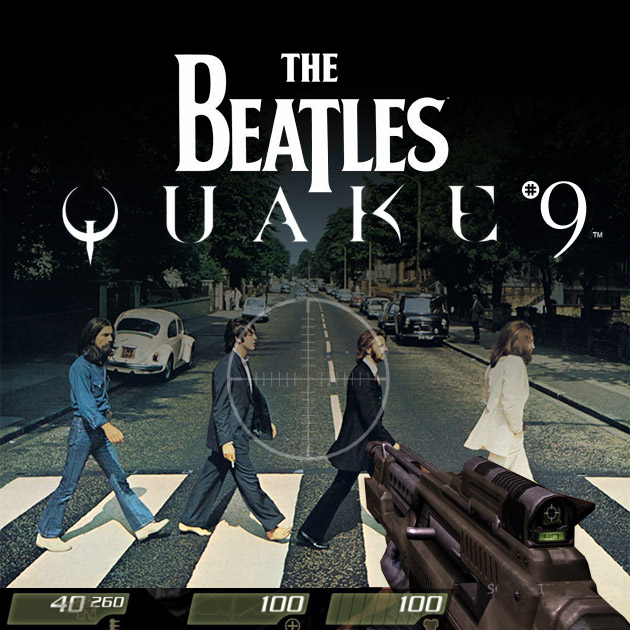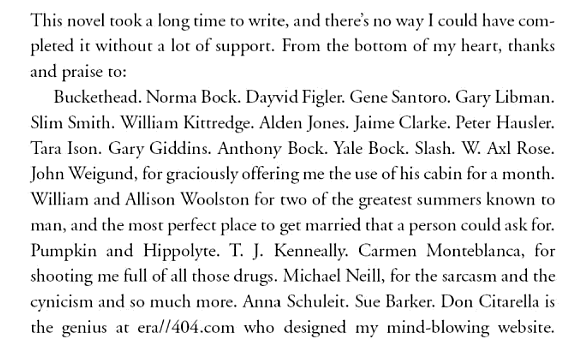Italian graphic designer Emanuele Abrate has come up with an interesting project titled ‘Who Designed it?’, in which he substitutes wordmarks of famous logos with the names of the designers and agencies who created them.
amazon
Beatlemania v2.0

Photo Credit: The Beatles Quake #9. My recommendation for the next Beatles Video Game.
I used to like The Beatles. I mean, I never loved them. My first direct encounter with them was a high school friend, Sean, singing their praises every chance he got, replying to my dismissals of repetitive, dated, jingle-sounding ditties with “then why are they the best selling band of all time?” exclamations.
Most of their songs (“Paperback Writer”, “Blackbird”, the entire “Sergeant Pepper…” album, etc.) I hate with a passion. However, over the last decade — since Sean’s proselytizing — I’d grown to tolerate a handful of their songs and actually like a few (David Cook’s rendition of “Eleanor Rigby“, Alanis Morrisette’s live “Dear Prudence“).
This is no more. The recent death of Michael Jackson (and the sale of his rights to their music), the recent concerts by Sir Paul McCartney, the sale of “The Beatles’ Remastered” collection, the release of The Beatles’ Rockband and the “Mono” boxset (the 13 CD set that is currently/still out-of-stock at Amazon.com) have put the final nail in the coffin of my Beatles tolerance. The guise has been lifted and whatever respect I had for the remaining members as people and artists is no longer. The over-saturation has presented their canon as a corporate money-making machine and, worse, exposed how formulaic and near-identical their songs actually are. I’ve joined the ranks of Starbucks boycotters, but may be the only disgruntled ex-customer to do so ONLY because I cannot stand their endless repeating of Beatles songs (I happen to believe them when they say they’re fair trade, good to employees, and provide a service different from local non-franchised cafés). Last Saturday, my penultimate visit to the caffeine behemoth, I left after 45 minutes; enough time to hear “We Can Work it Out” three times. I walked in yesterday, temporarily forgetting my moratorium on patronage, was rudely re-awakened with the unsettling harmony of the walrus, and promptly exited before I could hear one “coo-coo cachoo”.
I vaguely remember this feeling bubbling over with the release of The Beatles “1” (One) album during my high school years but have never felt such execration toward them as artists, only against their team of marketers and publicists. And this whole situation which, besides making me physicially nauseated by their music, has created two new truths for me:
1. If you throw enough money to promote something (boxsets, collections, video games, whatever), people will unwittingly be tricked into not only BUYING something, but believing they actually like it.
2. There is no longer any direct correlation between album (or book, or movie, or whatever) sales and talent/quality products, only marketing dollars. Yes, I realize this is the same decree that conservatives shouted from the rooftops about the 2008 presidential campaign. No, I do not believe it applies.
So thanks go to you: Sir Paul McCartney, Harmonix Music Systems, EA Distribution, MTV Games, Amazon.com, 104.3 FM, Starbucks, EMI and the partially rotting, mostly unbiodegradable corpse of Michael Jackson.Thank you for proving my instinctive reaction to The Beatles back in high school when I first told Sean they were crap. I firmly know now the answer to his question: millions and millions of marketing dollars.
Charles Bock Credited Me

 One of my favorite authors and good friends, Charles Bock, mentioned me and my studio in the acknowledgements for his New York Times bestselling novel, Beautiful Children.
One of my favorite authors and good friends, Charles Bock, mentioned me and my studio in the acknowledgements for his New York Times bestselling novel, Beautiful Children.
From Publishers Weekly:
A wide-ranging portrait of an almost mythically depraved Las Vegas, this sweeping debut takes in everything from the bland misery of suburban Nevada to the exploitative Vegas sex industry. At the nexus of this Dickensian universe is Newell Ewing, a hyperactive 12-year-old boy with a comic-book obsession. One Saturday night, Newell disappears after going out with his socially awkward, considerably older friend. Orbiting around that central mystery are a web of sufferers: Newell’s distraught parents, clinging onto a fraught but tender marriage; a growth-stunted comic book illustrator; a stripper who sacrifices bodily integrity for success; and a gang of street kids. Into their varying Vegas tableaux, Bock stuffs an overwhelming amount of evocative detail and brutally revealing dialogue (sometimes in the form of online chats). The story occasionally gets lost in amateur skin flicks, unmentionable body alterations and tattoos, and the greasy cruelty of adolescents, all of which are given unflinching and often deft closeups. The bleak, orgiastic final sequence, drawing together the disparate plot threads, feels contrived, but Bock’s Vegas has hope, compassion and humor, and his set pieces are sharp and accomplished.
I definitely recommend you pick up a copy:





